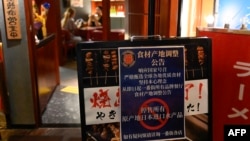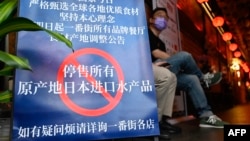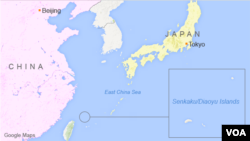Japan on Tuesday urged China to take all measures to ensure the safety of Japanese residents and diplomatic missions in China amid public outrage after Japan began releasing treated radioactive water from its crippled Fukushima nuclear power plant.
Japanese Foreign Minister Yoshimasa Hayashi said to reporters in Tokyo that Japan called on China to appeal to its citizens to act calmly in order to prevent the situation from escalating.
Chinese foreign ministry spokesperson Wang Wenbin said China “protects the safety” of foreigners in China.
"Ignoring the strong doubts and opposition of the international community, the Japanese government unilaterally and forcibly started the discharge of contaminated water from the Fukushima nuclear accident, which aroused strong indignation among people of all countries," Wang said.
After Beijing banned imports of Japanese seafood, Chinese netizens began to call for boycotts on a wide range of Japanese products while others tried to stock up on essential supplies.
Some analysts say Beijing is sending a message to Tokyo through anti-Japan sentiment.
“Japan has released the wastewater and there is no rolling back on that, so [allowing nationalistic sentiment to flare up may be a way] for China to show its displeasure,” Ian Chong, a political scientist at the National University of Singapore, told VOA in a phone interview.
Beijing faces a slew of domestic challenges, including a slowing economy, record-high unemployment and abrupt personnel reshuffling in the foreign policy and military sectors. Some observers say the Chinese government is trying to initiate some damage control by changing the focus of domestic discussion and magnifying a public health issue that would be of concern to Chinese citizens.
“Nationalism is the most convenient tool for Beijing to rally society, and public health issues such as the invisible and foreign threat of radiation can cut across class, geographic and ethnic lines,” Wen-Ti Sung, a political scientist at the Australian National University, told VOA in a phone interview.
Japan maintains that the release of the treated water is safe, a claim supported by the International Atomic Energy Agency; however, Chinese foreign ministry spokesperson Wang Wenbin said Tokyo’s move was “extremely selfish and irresponsible.”
“We urge Japan to change course, immediately correct its wrongdoing and dispose of the nuclear-contaminated water in a truly responsible way,” said Wang during a press conference last week.
Since Japan released the treated water, Chinese netizens have been urging the public to avoid a long list of Japanese products, including cosmetics, baby and pet products, and different kinds of food. They claimed those products may contain contaminated ingredients.
“Instead of avoiding certain Japanese brands, I will turn around when I see the word ‘Japan’ on any product,” wrote one netizen on the popular Chinese social media platform Weibo. Some netizens encouraged others to support Chinese products.
In addition to calls on social media for a broad-based boycott of Japanese products, Chinese media reported that some Chinese tourists have withdrawn from scheduled group tours to Japan, which has long been one of the top travel destinations for Chinese people.
The widespread call for boycotting Japanese products also pushed Chinese consumers to stock up on salt out of concern the discharged water could affect its quality and cause a shortage in the future.
To calm the growing public anxiety, China’s state-run National Salt Industry Group said in a statement it had been ramping up supplies of salt and urged people not to “panic buy blindly.”
Even though the Chinese internet has been flooded with anti-Japan sentiment, Chong said China’s official response of banning Japanese seafood imports was “surprisingly weak.”
“If China really wanted to send a strong signal, it could go after Japanese electronics, cars, or microchips, but China isn’t doing that,” he said.
In his view, Beijing’s response reflects its understanding that the Chinese supply chain still needs to rely on parts and technology from Japan.
“Too drastic a move could also scare other trade and business partners more, which could worsen China’s economic situation,” Chong told VOA.
Preventing public outrage from going to extremes
Apart from calls to boycott Japanese products, Chinese netizens are also displaying outrage toward Japan’s decision through viral videos on Chinese social media platforms. In one video, the owner of a Japanese restaurant in Guizhou province trashed his store due to “nationalistic sentiment.”
Another viral video on social media platform X, formerly known as Twitter, shows a teacher characterizing Japan’s behavior as “shameless” and urging students to pick up their pens “as weapons” and write a letter to Japanese Prime Minister Fumio Kishida.
In addition to the online outrage, Japanese businesses and organizations have been overwhelmed by harassing phone calls from Chinese speakers, and a stone was reportedly thrown onto the grounds of a Japanese school in the Chinese city of Qingdao, according to Japanese media reports.
Anti-Japan sentiment has flared up in China from time to time since 2012. During that year, territorial disputes over a chain of islands known as Diaoyu in Mandarin and Senkaku in Japanese caused street protests and boycotts of Japanese products. In some instances, Chinese protesters attacked Japanese-made cars and smashed windows of Japanese-owned businesses.
Apart from ongoing territorial disputes, the brutal acts committed by the Japan Imperial Army against the Chinese during the Second Sino-Japanese War, which coincided with World War II, have contributed to the longstanding anti-Japan sentiment that exists in Chinese society.
While China has allowed nationalistic sentiment to spread online, some analysts say the government won’t let the current situation get to the level of chaos that was seen in 2012.
“In past instances, the Chinese government would begin to censor ultra-nationalistic voices online when the situation was growing out of control,” Yaqiu Wang, senior China researcher at Human Rights Watch, told VOA.







